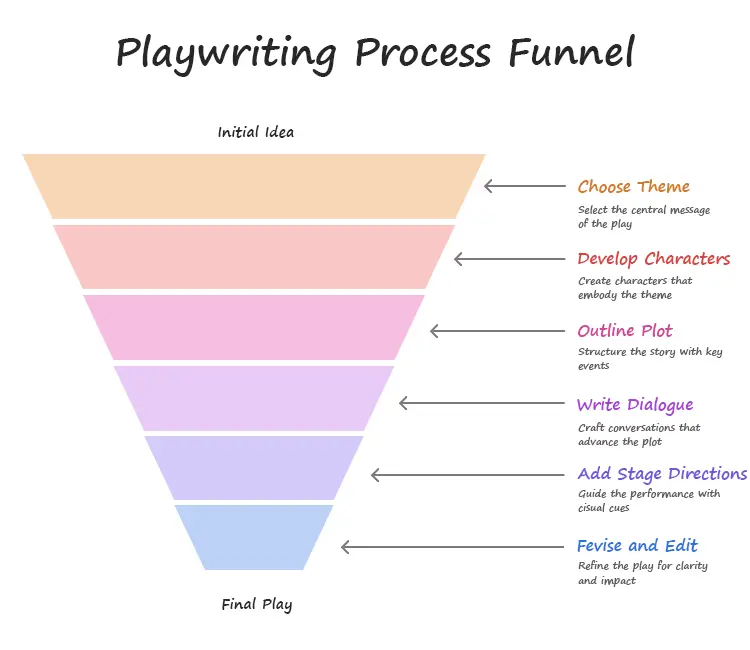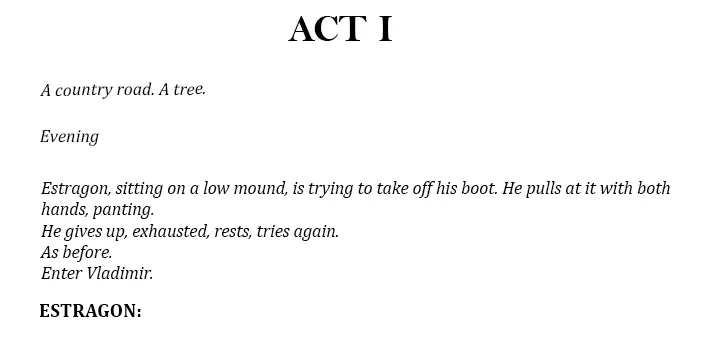How to Write an Acceptance Speech: A Step-by-Step Guide
Learn how to write an impactful acceptance speech in 2026. Step-by-step tips, structure, and examples to help you express gratitude confidently and cl...
The roots of playwriting are embedded in ancient cultures, festivals, and rituals. These were the only sources of entertainment for people when the screens, sounds, and technology were not there. Playwriting simply means writing an artistic or dramatic script for a performance on stage. Where a playwright will be responsible for developing narratives, characters, and compelling dialogues that craft the storyline of the drama, the aim is that these plays will be performed on stage for the audience. Plays are not like other literary genres where the author tells a story, and you understand the most in-depth emotions of the character and the plot. In plays, the story can be understood only through the dialogues of the characters, stage directions, and the scenic presentation of the actions and incidents by the dramatist. A play that is poorly written cannot be performed well on stage, which eventually does not fulfill the major requirement of a play.
Before you know how to write a play, it is essential to be informed about the different types of plays that exist. Students often have a lack of knowledge of the type of play they are writing, which raises concerns related to the theme of the play. Before writing a play, knowing them entirely is important.
Before you start writing plays, knowing some basics of the process or reading a Play Review or writing one is important. Let us focus on the key elements of playwriting:
| Element | Description | Example from Literature |
| Plot | Sequence of events with conflict and resolution | Romeo and Juliet: Lovers face a tragic fate. |
| Characters | Individuals driving the story | Hamlet: Prince Hamlet seeks revenge. |
| Dialogues | Spoken lines advancing the plot and character | “To be, or not to be: that is the question.” - A Soliloquy from Hamlet |
| Stage Directions | Instructions for actors and the set | "The apartment consists of two rooms, a bedroom and a kitchen, opening onto a narrow gallery and a common staircase." - from Tennessee Williams's A Streetcar Named Desire |
Theme | Central message or idea | "Knocked 'em cold in Providence, killed 'em in Boston. And what a human being! And they'll come for miles around to see him. Ph. D.s, doctors, university men. They'll wait in line to buy his merchandise." - Arthur Miller's Death of a Salesman, theme being the ultimately destructive nature of the American Dream |
Setting | Sets the stage for the characters and story. | "No curtain. No scenery. The audience, arriving, sees a bare stage. It is a large rectangular room with two doors at the back, one on each side. A kitchen table and chairs are in the center. At the left is a stove. At the right, a sink." - Thornton Wilder's Our Town |
Before you start to think about how to type a play, you must set the main idea or primary question you want your drama to explore before putting down any lines of dialogue, explore the conflicts in a Story for better ideas. A theme is not limited to the storyline but communicates a deeper and universal message you want to share. It underpins your play, determining why characters act as they do, which scenes have tension, and what emotional journey the play follows. If your novel involves love, betrayal, social wrongs, or the human condition, getting your own experience or a major event to underlie the theme will help your story be more engaging and meaningful.
After choosing your theme, come up with people who will represent and explore it. In addition to basic traits, describe your main characters and create the character motivation, , the obstacles they meet, and how they trust one another. Probe into their most basic drives, what they worry about, what things happened to them, and what shapes their identity. Who do the characters appear to be at the start of the play, and who might they evolve into? Think about the ways people interact, the sound of their perspectives, and the struggles within their minds. Your play’s story will be felt and understood by your audience if the characters are well-developed and convincing.
At this stage, demonstrate the progress of your story using the theme you have chosen. This outline guides you by listing the significant events from your play’s start to its finish. Whether it is a play or you are writing a novel, it provides a step-by-step guide to guidance. Introduce the first shock that changes the story and shows how problems for the characters become greater throughout the sequence. Notice the point in the drama that is its highest moment of action or dialogue. Then, draw the last section, showing what happens after the climax and how the theme comes to life. Using this structure leads to a unified and interesting plot.
Give your characters and plot a sense of life through what they say. All dialogue needs to seem natural and must also be used to advance the story, expose who a character is, and communicate the main theme. Every character should speak or behave differently from the others; each one of them must be unique with a different set of ideas. When writing conversations, make them sound natural and avoid long-winded speech. Notice the meaning that lies between the actual lines, since this can bring out important truths. Your lines must be intentional, and they must be written in a way that enhances the story, adds more interest to the plot and presentation of characters, and contributes to the purpose of the play. Read the text aloud, as this helps you evaluate whether or not it is realistic.
Going past the usual guidelines, mark notes in the playwriting script to guide everyone during the play’s performance. They explain where and how you should enter or exit, how you move, significant gestures, ways to look, and the style of your voice. It’s important not to push your vision too strongly so that the director and actors can put in their own ideas. Shakespeare’s techniques can be used to explain what is not spoken, let the audience know when a scene is done, describe the setting and props, or emphasize the mood and deepen character understanding, so long as they also help the plot.
After that, we move on to the main step of designing, which is refining the design by editing. Individually investigate each page every time you go through the play. Remember to keep an eye on how clear your story is, how effective the timing is, and how false steps are avoided upon reading it. Try to notice areas in the story where the action becomes dull, the actors don’t take their roles seriously, and the dialogue sounds unnatural. Do not put anything in the script that does not strengthen your main point. Pay attention to moving the story forward piece by piece to reach its highest point. Let your friends who read a lot read your drafts or attend a writing workshop. Improving, making it tighter, and polishing the draft turn it into a play that can stand on stage.

The opening plays an essential part in writing a play, as these first lines must be impressive enough to persuade the reader to go along with the complete drama:

- Waiting For Godot by Samuel Beckett

- The Glass Menagerie by Tennessee Williams
Write a 10-minute one-act play to build confidence.
Be creative with the titile and the beginning of your story.
Choose familiar locations like schools or parks to simplify staging.
Start reading the plays, as the more you read, the more clearly you understand the structure and requirements.
Let the characters’ words drive the story, avoiding excessive narration.
Before you start the play, understand the structure and plot clearly.
Read aloud or stage a reading with friends to check pacing.
Construct your dialogues to define the story.
Brainstorm with prompts like “What if two friends find a hidden treasure?”
Share drafts with classmates or teachers for constructive input.
StudyUnicorn.com: Professional playwriting tips and writers from around the world with experience and educational backgrounds that are well-suited for the role.
The Playwright’s Guidebook by Stuart Spencer.
Writing for the Stage by Leroy Clark.
Playwriting: Structure, Character, How and What to Write by Stephen Jeffrey
The Playwright's Guidebook by James M. Stein
Celtx: Free scriptwriting software for play formatting.
Final Draft: Industry-standard tool for professional scripts.
Reddit r/playwriting: For feedback and inspiration.
When you are struggling with how to make a play, first, you must start working on your plot, major issues, conflict, characters, their behavior and personalities, and setting, and select the theme. Think of a creative beginning that can reflect your story and bring a flow to it so it can easily be explained. Start to write the first draft of your story so you have an idea of what you want to present. Use standard format with character names, dialogue, and stage directions. Convert your story into dialogues and craft a play.
Plays can be very short, as in 10-minute plays, or can tell a complete story in one act and last from 20 to 75 minutes. Most times, full-length plays run from 90 minutes to 2.5 hours, with breaks. So they can have in-depth stories and well-developed characters. Choosing how long a movie is comes from understanding how the story needs to be told.
Yes, you don’t need to have been involved with theater to write a play. Although acting, directing, or technical knowledge can help you interpret how to write a play script for the stage, it’s not necessary. To make a strong play, build good characters, offer exciting conflict, and use natural dialogue. A major part of becoming a playwright involves acting as a writer only, practicing storytelling for theater by reading and enjoying other plays, going to shows, and using comments to help develop their work. A lack of direct experience must not stop you from being creative.
In simple language, a play is supposed to be performed on stage with minimal settings and characters. Everything happens on one stage. When it comes to screenplays, they are written as visual representations of a story for screening on TV or in cinemas. Plays are for the stage, while screenplays are for film/TV with more visual descriptions.
To make your play engaging and interesting, highlight strong characters, make sure their aims are clear, and ensure there are plenty of challenges with outcomes that matter. Write their conversation lines to come across as expected dialogue but also to develop the plot, expose who the characters are, and sometimes communicate things that go deeper. As a result, the play is exciting, easy for the audience to understand, and enjoyable to see.
While writing a play, formatting is essential to form clarity for the reader. Characters, along with their dialogues, must be placed within a specific space, incorporating the details of stage directions and scene descriptions. Italicised lines with proper directions of the situation surrounding a scene bring out a complete understanding of the story and plot. Writers must ask others to read the copy of their play and collect feedback so they can make the vital changes to the format.
Subscribe now!
To our newsletter for latest and best offers